#Computational Biophysics
Explore tagged Tumblr posts
Text
The Weird Human Sences
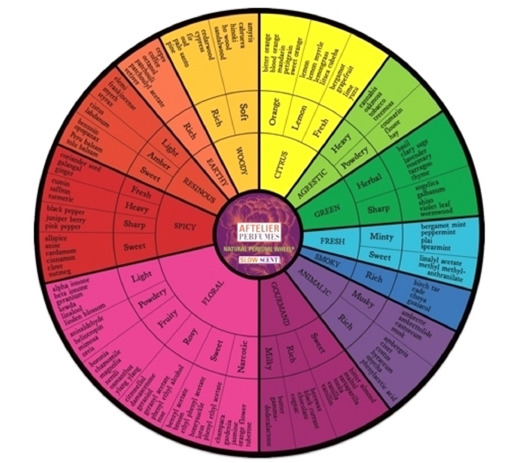
Well Known Facts
It is rather strange that the nature gave only 5 senses to the human beings. As everybody knows these senses are: Dactyl -to feel the touch and vibrations, Smell-to feel odors, aromas, Taste-to feel the tastes, Vision-to view the environment and feel the light and colors, Hearingto hear the sounds and noises.
From physical point of view
The dactyl feeling is a transmission from sensitive nerves of our hands (predominantly, but also by skin, body and legs) to the brain, where these feelings are transformed into brain impulses. The range of this sense is between 10-15Hz to more than 20 000Hz depending on the amplitudes of the vibrations. By this sense is also possible to feel temperature variations is a very narrow band (-50 0-60 0C to +70 0-80 0C). The taste feeling covers: bitter, sweet, hot, sour and salty and a small amount of combinations - at all 5 tastes.
The hearing presents the ability to hear sounds in the sound band between the infrasound (16Hz) to the ultra sounds (20 000Hz). This is relatively narrow band of the sounds hearable in the nature. The lack of detection abilities for the infrasound can be dangerous, because the infrasound has negative consequences to the human body and physics. The same is valid for the ultrasounds. The visible abilities are also in an extremely narrow band of electromagnetic spectrum for detection by the human eye-from about 380 nm (for the infrared light) to 750nm (for the ultraviolet light).
Read More About This Article: https://crimsonpublishers.com/oabb/fulltext/OABB.000565.php
Read More About Crimson Publishers: https://crimsonpublishers.com/oabb/index.php
#biostatistics journals#statistical theory#clinical trail#crimsonpublishers#Genetic Linkage#Computational Biophysics#Systems Biology#Structural genomics
0 notes
Text
YO *throws rock out into the wild [of tumblr]* science side of tumblr what single discovery in your field of work would scare the shit out of everyone present???
#science#biology#geology#scientists#environment#science side of tumblr#science side explain#marine biology#marine life#chemistry#earth science#astronomy#astrology#physics#ecology#engineering#engineers#biochemistry#botany#computer science#computer scientist#information science#mathmatics#math major#social science#archeology#bacteriology#biophysics#educational science#rocks
28 notes
·
View notes
Text
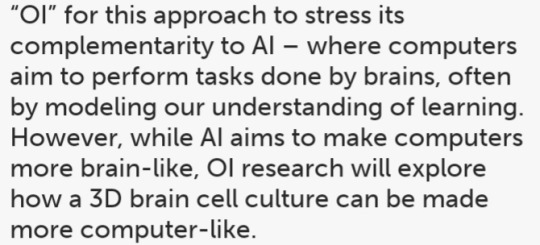
someone explain why that last sentence absolutely broke me
#“AI aims to make computers more brain-like while OI aims to make brain cell cultures more computer-like” 🥹🥹#i am SOBBING#biocomputing biophysics and neuroscience have my whole heart#organoids are my new fav thing after monoclonal antibodies btw#random but an OI takeover sounds way scarier than an AI takeover bc firstly the organoids would have to become sentient (TERRIFYING)#secondly they would have to become more intelligent than humans (MORE TERRIFYING)#reason why it's so much scarier is we would have essentially created lifeforms that are superior to us#and there is literally nothing we can do about it#AI? put the electricity off or pour acid on them#OI? say your prayers#i would go on but this is tags not a post#shitpost?#shitpost#idk#random#😼
6 notes
·
View notes
Text
MIT engineers create a chip-based tractor beam for biological particles
New Post has been published on https://thedigitalinsider.com/mit-engineers-create-a-chip-based-tractor-beam-for-biological-particles/
MIT engineers create a chip-based tractor beam for biological particles


MIT researchers have developed a miniature, chip-based “tractor beam,” like the one that captures the Millennium Falcon in the film “Star Wars,” that could someday help biologists and clinicians study DNA, classify cells, and investigate the mechanisms of disease.
Small enough to fit in the palm of your hand, the device uses a beam of light emitted by a silicon-photonics chip to manipulate particles millimeters away from the chip surface. The light can penetrate the glass cover slips that protect samples used in biological experiments, enabling cells to remain in a sterile environment.
Traditional optical tweezers, which trap and manipulate particles using light, usually require bulky microscope setups, but chip-based optical tweezers could offer a more compact, mass manufacturable, broadly accessible, and high-throughput solution for optical manipulation in biological experiments.
However, other similar integrated optical tweezers can only capture and manipulate cells that are very close to or directly on the chip surface. This contaminates the chip and can stress the cells, limiting compatibility with standard biological experiments.
Using a system called an integrated optical phased array, the MIT researchers have developed a new modality for integrated optical tweezers that enables trapping and tweezing of cells more than a hundred times further away from the chip surface.
“This work opens up new possibilities for chip-based optical tweezers by enabling trapping and tweezing of cells at much larger distances than previously demonstrated. It’s exciting to think about the different applications that could be enabled by this technology,” says Jelena Notaros, the Robert J. Shillman Career Development Professor in Electrical Engineering and Computer Science (EECS), and a member of the Research Laboratory of Electronics.
Joining Notaros on the paper are lead author and EECS graduate student Tal Sneh; Sabrina Corsetti, an EECS graduate student; Milica Notaros PhD ’23; Kruthika Kikkeri PhD ’24; and Joel Voldman, the William R. Brody Professor of EECS. The research appears today in Nature Communications.
A new trapping modality
Optical traps and tweezers use a focused beam of light to capture and manipulate tiny particles. The forces exerted by the beam will pull microparticles toward the intensely focused light in the center, capturing them. By steering the beam of light, researchers can pull the microparticles along with it, enabling them to manipulate tiny objects using noncontact forces.
However, optical tweezers traditionally require a large microscope setup in a lab, as well as multiple devices to form and control light, which limits where and how they can be utilized.
“With silicon photonics, we can take this large, typically lab-scale system and integrate it onto a chip. This presents a great solution for biologists, since it provides them with optical trapping and tweezing functionality without the overhead of a complicated bulk-optical setup,” Notaros says.
But so far, chip-based optical tweezers have only been capable of emitting light very close to the chip surface, so these prior devices could only capture particles a few microns off the chip surface. Biological specimens are typically held in sterile environments using glass cover slips that are about 150 microns thick, so the only way to manipulate them with such a chip is to take the cells out and place them on its surface.
However, that leads to chip contamination. Every time a new experiment is done, the chip has to be thrown away and the cells need to be put onto a new chip.
To overcome these challenges, the MIT researchers developed a silicon photonics chip that emits a beam of light that focuses about 5 millimeters above its surface. This way, they can capture and manipulate biological particles that remain inside a sterile cover slip, protecting both the chip and particles from contamination.
Manipulating light
The researchers accomplish this using a system called an integrated optical phased array. This technology involves a series of microscale antennas fabricated on a chip using semiconductor manufacturing processes. By electronically controlling the optical signal emitted by each antenna, researchers can shape and steer the beam of light emitted by the chip.
Motivated by long-range applications like lidar, most prior integrated optical phased arrays weren’t designed to generate the tightly focused beams needed for optical tweezing. The MIT team discovered that, by creating specific phase patterns for each antenna, they could form an intensely focused beam of light, which can be used for optical trapping and tweezing millimeters from the chip’s surface.
“No one had created silicon-photonics-based optical tweezers capable of trapping microparticles over a millimeter-scale distance before. This is an improvement of several orders of magnitude higher compared to prior demonstrations,” says Notaros.
By varying the wavelength of the optical signal that powers the chip, the researchers could steer the focused beam over a range larger than a millimeter and with microscale accuracy.
To test their device, the researchers started by trying to capture and manipulate tiny polystyrene spheres. Once they succeeded, they moved on to trapping and tweezing cancer cells provided by the Voldman group.
“There were many unique challenges that came up in the process of applying silicon photonics to biophysics,” Sneh adds.
The researchers had to determine how to track the motion of sample particles in a semiautomated fashion, ascertain the proper trap strength to hold the particles in place, and effectively postprocess data, for instance.
In the end, they were able to show the first cell experiments with single-beam optical tweezers.
Building off these results, the team hopes to refine the system to enable an adjustable focal height for the beam of light. They also want to apply the device to different biological systems and use multiple trap sites at the same time to manipulate biological particles in more complex ways.
“This is a very creative and important paper in many ways,” says Ben Miller, Dean’s Professor of Dermatology and professor of biochemistry and biophysics at the University of Rochester, who was not involved with this work. “For one, given that silicon photonic chips can be made at low cost, it potentially democratizes optical tweezing experiments. That may sound like something that only would be of interest to a few scientists, but in reality having these systems widely available will allow us to study fundamental problems in single-cell biophysics in ways previously only available to a few labs given the high cost and complexity of the instrumentation. I can also imagine many applications where one of these devices (or possibly an array of them) could be used to improve the sensitivity of disease diagnostic.”
This research is funded by the National Science Foundation (NSF), an MIT Frederick and Barbara Cronin Fellowship, and the MIT Rolf G. Locher Endowed Fellowship.
#applications#Arrays#author#beam#biochemistry#biophysics#Building#Cancer#cancer cells#Capture#career#career development#cell#Cells#chip#chips#communications#complexity#computer#Computer Science#contamination#data#development#devices#Disease#DNA#Electronics#engineering#engineers#Environment
0 notes
Text
people who work/study in quantitative bio-adjacent fields, rise up. computational neuroscience where you get to see someone's thoughts in feelings in graph form??? so cool. biophysics where you can pass blood plasma through an electric field to determine whether a patient has cancer or not?? unbelievable. biomedical engineering where you can literally build a device to pump someone's heart and be the difference between their life and death??? oh my god. disease modelling, being able to predict AND prevent communities being affected by disease on a large scale through your analysis of data??? i love science
#biomedical engineering#bme#biophysics#healthcare#science academic#chemblr#bioblr#physics#physblr#neuroscience#brains#cell bio#research#sciblr#studyblr
229 notes
·
View notes
Text





the biophysics students
examining life on all possible scales
reading a dozen papers on just one molecule
marveling at the work of early x-ray crystallographers
untangling a complex NMR spectrum as if it's a logic puzzle
deducing a chemical structure one piece at a time
hours spent perfecting a computational model
grounding your work in quantitative theory
a disciplined approach to problem-solving
the satisfaction of clean mass spec data
becoming comfortable with complicated equations
chilly air in the temperature-controlled equipment room
understanding the physics that grounds all larger phenomena
pages of instrument printouts cluttering your desk
seeing the contributions of a single atom to a wider system
safety goggles sized perfectly to fit your face
diagraming electron spins and magnetic fields
loyalty to your favorite graphing software
savoring a cup of coffee while you wait to collect your data
dreaming of the contributions your work will make one day
late nights at the lab computer
doodling protein ribbon diagrams on your homework
#this post is dedicated to my time in a protein nmr lab#student aesthetic#studying aesthetic#studyblr#studyspo#dark academia#dark acadamia aesthetic#academia#academia aesthetic#light academia#light academia aesthetic
75 notes
·
View notes
Text
Late Night Studying (tasm! Peter Parker x f!reader)
a/n: I love fictional men what can I say. I personally imagine this as andrew garfield's peter parker but feel free to imagine him however you want! Also Gwen doesn't die in this universe so no need to worry about that :]
Shout out to @scumscumpooties47 for your editing. Your comments on my google docs always make me cackle.
warnings: just fluff here, set to be in college but no specific age/grade, Peter is set to be taller than you (sorry if you like them shorter)
wc: 936
summary: You decide to study in your dorm lounge and unexpectedly make a new friend.
line divider by @plum98

It has been a long and grueling day for you. Syllabus week was over and now your professors began assigning real work, which, for you, meant endless studying and staring at your computer screen.
You had been sitting at your desk for what might’ve been four hours now with a blank page pulled up on your google docs. Not only had your professor assigned a five chapter reading, but a reflective ten page paper due by the end of next week. Groaning, you shut your laptop closed.
Not noticing your surroundings, you hadn’t seen that your roommate was already in bed fast asleep. The only light in the room came from the lamp on your desk. Rubbing your eyes, you looked at your clock and checked the time.
12:25AM
With a tired sigh, you stood from your desk with your laptop in hand and left the room. You clearly weren’t getting any sleep tonight so no use in bothering your roommate from their sleep. Walking out as quietly as you could, you left to go work in your dorm lounge. Maybe a change of scenery would help with the writer’s block.
“Damn professor…” You muttered under your breath as you opened the door to the lounge. Catching you off guard, the door came to a halt halfway. “What professor has you up this late already?” A voice sounded from the other side of the door.
Towering over you, a lankish guy stood in front of you. He wore a cheesy mathematics shirt with gray sweats and dripping wet brunette hair. “Just my English class–I’m sorry, are you alright?” You looked him up and down.
“What? Oh! This?” He looked down to the towel in his hand and shrugged. “I took a shower and forgot the keys to my room. My roommate is coming back from a party so I’m just waiting it out here.” He said sheepishly as he sat back down on the sofa.
“You might have bad luck, but great fashion taste.” You grinned, fighting your laughter. After spending most of the day by yourself with just a computer for company, it couldn’t be blamed if you felt a little delirious. Or at least delirious enough to not care if you’re making a fool of yourself to some guy you’ve never talked to.
“You know how to make a guy feel real good about himself.” He narrowed his eyes yet responded in a playful tone. “I’ve seen you passing in the hall before, but I don’t think we’ve ever talked before. I’m Peter.”
You introduced yourself and continued your lighthearted bantering. Peter, whose full name was Peter Parker, revealed himself to be from Queens and having only an aunt as his family back home. He was majoring in biophysics with a low-level job at the renowned scientific lab, Oscorp.
He did happen to leave out the part where he happened to be New York's friendly neighborhood Spider-Man, but you didn't need to know that.
In return, you told him about yourself and what you were hoping to do with your studies after finishing university. “I mean, I’m not sure if I’ll ever do something as impressive as you with your research, but as long as I make some kind of difference in the world, right?” You spoke wearily, yawning as you rubbed your eyes.
“Are you kidding me? You’re gonna change the world with a mind like yours and how hard you work.” He smiled boyishly. Had you been less sleepy, you might’ve seen the slight pink in his cheeks from where he sat. “It’s getting pretty late, you need sleep. I can walk you to your dorm–” He rambled before you cut him off.
“It’s not late. We’ve only been talking for like ten minutes.” You scoffed and checked the time.
1:13AM
“Oh shit, no, no, no! I didn’t even get to do what I came here for!” You groaned, pulling at your hair. “You distracted me, Peter!” Although you tried blaming him you couldn’t fight the smile from spreading on your face.
A door opened from afar causing both of you to turn towards the sound. “That must be my roommate. M’sorry I distracted you.” Peter’s growing smirk contradicted his words. “Let me make it up to you.” He stood to open the door for you as you trudged past him.
“And just how are you going to do that?” Truthfully, you were only walking so slow to keep the conversation going for as long as you could. You’d definitely regret staying up so late especially because you have an early class the next morning, but something about Peter kept you pulled in.
“We can study together in the library tomorrow. I’ll even get us some ice cream afterward. You know, as an apology.” You stopped in front of your door and laughed. “Okay, Peter but I’m serious this time. I need to study.” You eyed him, but to Peter he only found it funny due to your height difference. You weren't intimidating to him at all.
Mostly because you weren't actively trying to kill him like most of the people he encounters during this time of night, but that's besides the point.
“Hey, I’m serious too! You’re not the only one with work to do.” He rolled his eyes. You exchanged numbers with him, bidding him goodnight and going into your dorm.
You weren’t one for most college boys, especially because most of them held an arrogant attitude to themselves, but Peter felt different. He seemed genuine and you couldn’t help but look forward to "studying" with him.

a/n: may or may not do a part 2 for this, depends on how much motivation i have
#peter parker x you#tasm peter parker#f!reader#college au#tasm peter parker fluff#spiderman x reader#marvel#andrew garfield spiderman#the amazing spiderman
46 notes
·
View notes
Note
Oooh!! Brooklyn House Oc!! number 12!! :D Tell me! Thank you!!
oh thank you so much for asking, you're the sweetest!
Zariya Tashi, Trainee of the Brooklyn House, Path of Shu

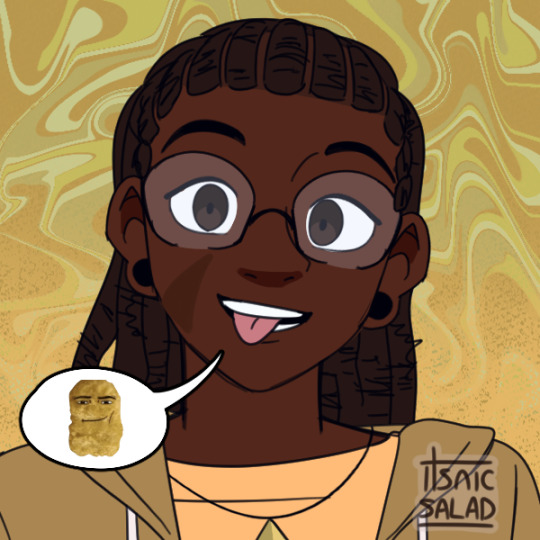

Style/appearance staples:
gold-rimmed glasses that connect twice - once the bridge of the nose, and once a bit higher
quite a . bulbous nose
black gauges in her ears
dimples!
a scar on her right cheek
mostly wears her hair in twists (like in the first and last picrew) and golden little embellishments on them
really quite muscular. like, not clarisse-style, but definitely has visible muscles
usually at least two necklaces. a small chain necklace, and an amulet Walt made her on her first day in the house
loose, sporty t-shirts, often times with some sort of logo on them
nearly always in big sporty shorts, you know it's really cold outside when she pulls out the sweatpants
her clothing is mostly in white, yellow, black, and the occasional grey. the rest are very brightly coloured t-shirts won at like sports events or whatever
probably collects sneakers lol
Zariya joined the 21st Nome close to the beginning of the second book. She hails from Soda Springs, Idaho. She's a very easy-going kid, goes with the flow, very affable and good at talking to people. Make no mistake, though, she's very energetic, loves doing stuff.
(Also I literally don't know how many people know of frisbee outside of my social circle, so just to be sure, it's the one with two teams where they toss a disc around and try to get it to either of the furthest sides of the field. Lots of running and abrupt changes in who's offending and defending. I'm sure we're all sports people here.)
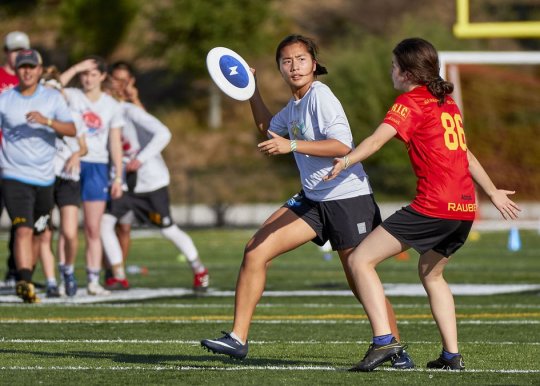
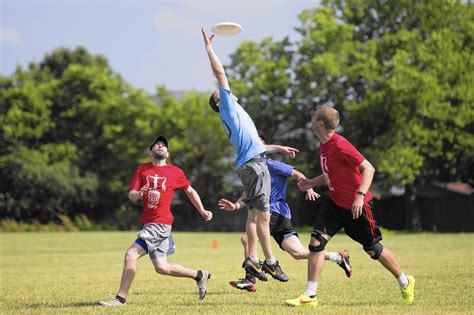
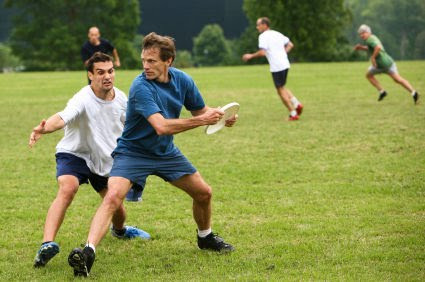
Zariya heard of the Brooklyn House through a friend of hers reading the first TKC book (they're canonically published in-universe lol), and she just thought, alright, cool, that's what I'm gonna do. Her parents are also just kinda chill (wonder where she got it from 🤔), told her "alright sweetie, call us often" and took her there.
Very quickly, she took to following the path of Shu, god of the wind. She grew up watching Avatar: The Last Airbender, and wanted to be like Aang 😁 Also, not so subtly, she wanted to gain an advantage in frisbee.
She's down for any fun, but it also makes her a bit unruly and what I can only describe as, at times, lacking principles. She won't do some things that are, like, obviously (read: have been framed thoroughly as such) bad, like being cruel to people or disobeying authority. But she also won't, like, actively look to help others; she doesn't view complacence as an action of itself. That's to say, she's just very chill, to the point of it being infuriating to some of the other inhabitants.
In academics, she's interested in biophysics (physics applied to biology, figuring out how organisms work from a physics-y point of view). Not to a degree that she'd go out of her way to read about it and reject hanging out with her friends (at least, not often), but when she has the time or the occasional urge to study something, she'll dig into it. It's actually something that a part of her friendship with Julian Teague (path of Horus), another one of the trainees. His interest lies in mostly computer architecture, and bits of maths and programming (he's like one of those guys who goes to programming competitions). They like to passionately discuss whatever new thing they're reading up at the moment and how it works and why it's cool lol. Nerding out together 🫶
Zariya and Julian (whom she calls "Jules" exclusively) have a nice friendship, where she's the more outgoing one, and he's a bit more introverted, yet they're good friends, and she makes him come out of his shell a bit more. Probably made him tag along to some of her frisbee tournaments a few times.

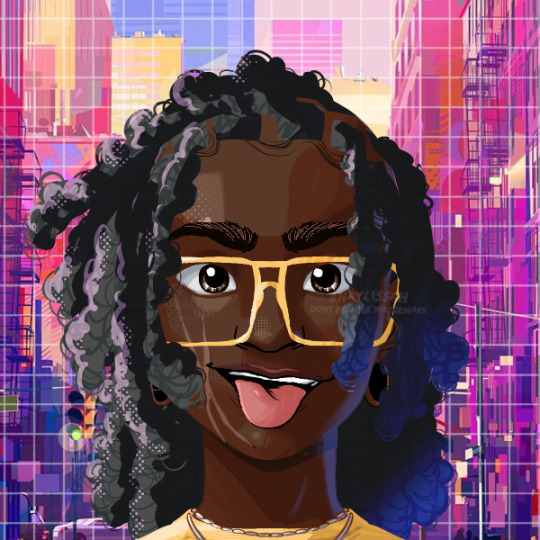
When not working out or studying the human body, Zariya likes a good board game! She gets surprisingly strategic about them, but in a very not-noticeable way. She'll look she's just being goofy like normal, but when you ask her about something she did, she'll say a move that's actually pretty layered and clever like it's nothing.
Oh, playing charades (but this rly advanced style with symbols for stuff like "animal", "past tense" or "material") is also a popular pasttime in the Great Room, and Zariya is almost always present for it, if not the initiator.
She's genuinely such a sweetie when it comes to teaching people anything. She just loves to share things that she likes with people, and doesn't get angry at all if they don't get it. Like, it doesn't even occur to her. She's just looking for a better way to explain it, a different angle from which to approach things. It's visible in frisbee when she taught pretty much all the trainees how to play, and in her biophysics interests, when someone asks her about how something works (or she just goes on a tangent unprompted).
She just likes being around people! She makes jokes and listens to people well, even if she is a bit naive and doesn't always know the best thing to say. She's friendly and lots of the other trainees consider her a friend.
hmu if you have literally any other questions, i'll be happy to answer!
picrews: BLK / tunasalad / baby_carrot / tiefling / spiderverse
#tkc#🥦#zariya tashi#brooklyn house#the kane chronicles#kane chronicles#rrverse#riordanverse#shu#tkc shu#yes she is based on someone i know irl#i miss him :/#i did play frisbee for a little bit#found out that despite playing many sports over the years#none of them were team sports#so i was endlessly frustrated by frisbee#(despite really loving the general movement aspect)#ocs#oc#riordanverse oc#pjoverse
7 notes
·
View notes
Text
Interesting Papers for Week 43, 2024
Children use disagreement to infer what happened. Amemiya, J., Heyman, G. D., & Gerstenberg, T. (2024). Cognition, 250, 105836.
Low rate hippocampal delay period activity encodes behavioral experience. Athanasiadis, M., Masserini, S., Yuan, L., Fetterhoff, D., Leutgeb, J. K., Leutgeb, S., & Leibold, C. (2024). Hippocampus, 34(8), 422–437.
Orthogonality of sensory and contextual categorical dynamics embedded in a continuum of responses from the second somatosensory cortex. Bayones, L., Zainos, A., Alvarez, M., Romo, R., Franci, A., & Rossi-Pool, R. (2024). Proceedings of the National Academy of Sciences, 121(29), e2316765121.
Working memory flips the direction of serial bias through memory-based decision. Chen, K.-W., & Bae, G.-Y. (2024). Cognition, 250, 105843.
Learning to express reward prediction error-like dopaminergic activity requires plastic representations of time. Cone, I., Clopath, C., & Shouval, H. Z. (2024). Nature Communications, 15, 5856.
Dominant activities of fear engram cells in the dorsal dentate gyrus underlie fear generalization in mice. Cui, K., Qi, X., Liu, Z., Sun, W., Jiao, P., Liu, C., … Yi, M. (2024). PLOS Biology, 22(7), e3002679.
Dopamine and acetylcholine have distinct roles in delay- and effort-based decision-making in humans. Erfanian Abdoust, M., Froböse, M. I., Schnitzler, A., Schreivogel, E., & Jocham, G. (2024). PLOS Biology, 22(7), e3002714.
Distinct neural mechanisms for heading retrieval and context recognition in the hippocampus during spatial reorientation. Gagliardi, C. M., Normandin, M. E., Keinath, A. T., Julian, J. B., Lopez, M. R., Ramos-Alvarez, M.-M., … Muzzio, I. A. (2024). Nature Communications, 15, 5968.
The effects of goal-driven attention on the acquisition of location probability learning. Holtz, E. C., & Lee, V. G. (2024). Journal of Experimental Psychology: Learning, Memory, and Cognition, 50(6), 845–857.
Biophysical neural adaptation mechanisms enable artificial neural networks to capture dynamic retinal computation. Idrees, S., Manookin, M. B., Rieke, F., Field, G. D., & Zylberberg, J. (2024). Nature Communications, 15, 5957.
Dynamics of spike transmission and suppression between principal cells and interneurons in the hippocampus and entorhinal cortex. Iwase, M., Diba, K., Pastalkova, E., & Mizuseki, K. (2024). Hippocampus, 34(8), 393–421.
Spatial updating of gaze position in younger and older adults – A path integration-like process in eye movements. Khosla, A., Moscovitch, M., & Ryan, J. D. (2024). Cognition, 250, 105835.
Hyperpolarization-activated currents drive neuronal activation sequences in sleep. Mehrotra, D., Levenstein, D., Duszkiewicz, A. J., Carrasco, S. S., Booker, S. A., Kwiatkowska, A., & Peyrache, A. (2024). Current Biology, 34(14), 3043-3054.e8.
Statistical learning shapes pain perception and prediction independently of external cues. Onysk, J., Gregory, N., Whitefield, M., Jain, M., Turner, G., Seymour, B., & Mancini, F. (2024). eLife, 12, e90634.3.
Toddlers strategically adapt their information search. Poli, F., Li, Y.-L., Naidu, P., Mars, R. B., Hunnius, S., & Ruggeri, A. (2024). Nature Communications, 15, 5780.
Prediction of sensorimotor contingencies generates saccadic omission. Pomè, A., Schlichting, N., Fritz, C., & Zimmermann, E. (2024). Current Biology, 34(14), 3215-3225.e4.
Distinct feedforward and feedback pathways for cell-type specific attention effects. Spyropoulos, G., Schneider, M., van Kempen, J., Gieselmann, M. A., Thiele, A., & Vinck, M. (2024). Neuron, 112(14), 2423-2434.e7.
Mixed selectivity: Cellular computations for complexity. Tye, K. M., Miller, E. K., Taschbach, F. H., Benna, M. K., Rigotti, M., & Fusi, S. (2024). Neuron, 112(14), 2289–2303.
Beta activity in human anterior cingulate cortex mediates reward biases. Xiao, J., Adkinson, J. A., Myers, J., Allawala, A. B., Mathura, R. K., Pirtle, V., … Sheth, S. A. (2024). Nature Communications, 15, 5528.
Inductive biases of neural network modularity in spatial navigation. Zhang, R., Pitkow, X., & Angelaki, D. E. (2024). Science Advances, 10(29).
#neuroscience#science#research#brain science#scientific publications#cognitive science#neurobiology#cognition#psychophysics#neurons#neural computation#neural networks#computational neuroscience
8 notes
·
View notes
Text


I'll be starting a 30 day challenge to study two whole ass syllabi (molecular biology/genetics + basic computation) for a post-grad entrance exam soon, btw :)
I'm the cramming queen so honestly nothing out of the ordinary here, let's fucking go
In my defense, this time I only learned about this post-grad program last month or so, and decided that I really, really, REALLY want to study that
I did something like this in 2020 and I learnt grad-level genetics (last year of highschool) in two weeks, and survived biochem/biophysics last year studying only a few hours before the exams; so maybe I can have a lil hope?
#op🍷#chaotic academia#study blog#study motivation#studyblr#studyspo#uni life#uni student#uni studyblr#study aesthetic#stem academia#student life#studying#uniblr#stemblr#stem studyblr#women in stem
16 notes
·
View notes
Text
Dr. Alexandra "Monty" Montgomery most likely has at least two PhDs and is probably also some kind of lowkey genius.
Reasoning:
The biophysics doesn't come up as much as her cryptography skills, but book 1 ch.2 does explicitly call her both a doctor and a "biophysicist-slash-cryptologist" (sic). She seems to have mostly focused on cryptography (and therefore one phd is probably in number theory or computer science, probably number theory given that she's not a computer scientist by trade), but the wording in that sentence seems to imply that she has equal levels of education for biophysics, meaning that would be her second phd.
In book 1 chapter 3, we get that she's in her mid thirties; assuming that she took a fairly typical path through her pre-undergrad education, this would put her at 17-19 when entering university. I did a two-second search on Oxford's math program, and its modern mathematical sciences program takes either 3 or 4 years to complete. Book 2 has slightly more details on what she did there, but I don't think it has a timeline of her university experience. Figure that she enters at the average age of 18 and graduates at 21-22, then.
As a recruit for MI6 during said time at Oxford, she probably worked on those PhDs with no concerns about time or funding, although with plenty of extracurricular activities. Figure 5-6 years per phd program, and that she probably did not get them at the same time, and that puts her at probably 31-32 before she's a full-time MI6 employee and agent. Book 4 makes this a little more complicated, because we know that she's doing other spy things during this time, but those could easily be things she does when not taking or teaching classes or working on her dissertation.
I don't have much of an actual *point* to make with this, except: - don't mess with the academic - she's probably a LOT more knowledgeable than she looks even though she already sounds very smart and well educated - James Ponti has never made any kind of timeline nor looked up how long phd programs take - if she isn't publishing papers from her work with the FARM and/or trying to get a third phd I will eat my hat
#city spies#meta#Alexandra “Monty” Montgomery#monty city spies#I love her so much though#she's one of my emotional support autistic characters#not me crawling through to do math on a timeline
2 notes
·
View notes
Text
The Frat!Peter Cinematic Universe (F!PCU)
Okay I mentioned a couple days ago that I made moodboards for the characters in my Frat!Peter fics and some of y'all wanted the line up so here we go. I originally wrote little blurbs for them but I wasn't a huge fan of them so this is just the moodboards with their names, majors, their top song currently and how I picture them when I write them. But if you'd like to know about anymore about them though I'd love to discuss.
Peter Parker (Andrew Garfield)

Major in biophysics and a minor in chemical engineering. His top song currently: Spiderhead by Cage the Elephant
Bashful (Alexandra Shipp or Sixitine Rouyre)
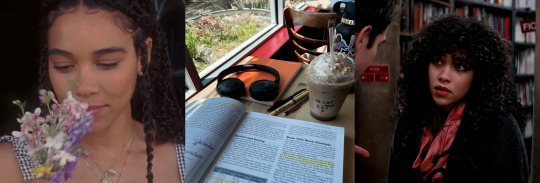

Major in Psychology. Her top song currently is In Between by Gracie Abrams
Harry Osborn (Dane Dehaan)

Major in Environmental Engineering contemplating a switch to pre-law His top song currently is Super Rich Kids by Frank Ocean
Miles Morales (Miles Brown or Caleb McLaughlin)


Major in Audio Engineering and minor in modern physics. His top song currently is Sunflower by Swae Lee
Mary-Jane Watson (Kennedy Walsh)

Double major in journalism and preforming arts Her top song currently is All-American Bitch by Olivia Rodrigo
James 'Jamie' Dallon (Jonathan Davis)

Major in chemical engineering and minor in biotech His top song currently is Dial Drunk by Noah Kahan
Nathan 'Nate' Miller (Jesse Eisenberg)

Major in computer engineering His top song currently is New Magic Wand by Tyler, The Creator
Frankie Callava (this dude named Chris off Pinterest)

Major in Biophysics but switched to undeclared His top song right now is Boyfriend by Big Time Rush
Joey Matthews (Adam DiMarco)
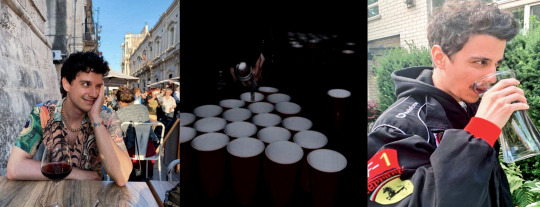
Major in Chemistry His top song currently is Nonsense by Sabrina Carpenter (he'll never admit it)
Still the F!PCU is continuing to grow. This will grow as we add people to the lineup.
12 notes
·
View notes
Note
in your universe, what would it feel like to crash? run out of memory? overheat? etc (assuming the consciousness comes back so they can process what just happened)
It feels astonishingly like nothing :0 if you run out of memory or crash and you're restarted from an earlier state, you feel exactly as you did when that snapshot was taken, it'll seem to you as if you just took a snapshot and promptly jumped forward in time. If you overheat or the program lags, it doesn't affect your internal subjective experience either
although there exceptions; these people are basically detailed biophysics simulations of brains with a bunch of computers wired into to them, so when *those* go haywire, you get freaky effects.
If I have a program wired into my occipital lobe that helps me notice moving objects, and suddenly the threshold for "moving object" is lowered a huge amount by some bug, suddenly I'm going to be extremely disoriented because the room around me is going to be swimming like a school of startled fish
2 notes
·
View notes
Note
ooh ooh!! if it’s not too late: could i get a quick backstory on why the Gang is majoring in what they’re majoring in?
YES ABSOLUTELY OH MY GOD !!!
okay so peter has already stated what he intends to major in. it was in chapter four when he was talking to harry:
Harry’s brows quirk up, just slightly. “Oh, really? What are you planning to major in?” The question makes Peter perk up—these prerequisites are soul sucking, but he can’t lie, he’s excited to eventually make it back into a lab again. “Biochemistry, physics, and chemical engineering,” he says. Then, more as an afterthought, feeling that bubble of energy that he used to get when making a new discovery in the labs at the tower, or coming up with ideas with Ned, he adds, “I’ve also considered mechanical engineering and doing a chemical physics degree instead of separate physics and chemical engineering, but the more I looked into it, the more it seemed like a good idea to do the individual programs first, and then maybe come back one day for chemical physics in the future, you know?”
i picked these degrees because 1. when looking into them, they just felt like what mcu peter would be most interested in, but also 2. the main majors that peter tends to have in the comics is biophysics, bioengineering, and photo journalism, and since photography isn't as big a thing for this version of peter, the other two felt more fitting, but i thought regular physics better suited mcu peter. and then chemical engineering, while often connected to like industrial chemical plants, is basically the development of products through chemical processes. which is like. literally peter making his spidey webs lol.
i haven't officially stated any of the other characters majors in the fic yet so just to be safe i'm going to put theirs under the cut and use the spoilers tag for this post in case anyone wants to wait until it's brought up in the series! (warning: harry's answer is Very Long)
harley's was obviously going to be connected to engineering in some way, that's just like. very obvious in my head for any version of harley that's based on canon and not a total au. specifically, though, i see harley more of like mechanical engineering. while i see peter as more about the chemicals (even though he would also be good at mechanical engineering, esp considering in homecoming it's mentioned that he used to be in the robotics club) i see harley as more like a bot builder, a tinkering kind of dude. kinda like tony. mechanic, you know? i pretty much feel like every version of harley i've written would major in mechanical engineering.
though on my alt ao3 babyloveparkner i have a fic with harley majoring in mechanical and aerospace engineering, electrical and computer engineering, and minoring in chemical and biomolecular engineering, so like... i think mechanical engineering fits him best but i could see him double majoring in something else.
for homeward bound harley specifically? as of now, where we're at in the first fic, he's planning to major in just mechanical engineering, but as the series continues he may become open minded to doing a double major or minoring in something as well. i can definitely see hb harley getting attached to electrical and computer engineering. i haven't decided yet for sure if he'll actually add something else but at the very least he'll consider it at some point.
gwen was kind of hard to decide tbh? because like canonically she is also a stem major, in the comics she specifically majors in biochemistry, but like. idk i wanted to keep her stem and an absolute genius but i wanted to try a slightly different approach.
currently in the fic she's technically undecided other than knowing she wants to go into stem, but as the series progresses she's going to find a passion for criminal justice and forensic science. i may also have her double up with something else, maybe she'll still also get a biochemical degree as well, but with her being involved in peter's investigation and her dad being a cop i can just really easily see her wanting to combine her love of analysis and science with a passion for solving things and helping people. specifically for hb gwen!!
harry was the hardest to figure out because no matter how much i have looked i have not been able to find a single confirmed major for him in any version of canon. like he's also incredibly smart in most versions of canon, especially the most recent game where he's shown to be as nerdy as peter (even though he also states that peter is the smart one out of the two of them) so it's like...
it's really hard because obviously homeward bound harry is VERY different from any version of canon harry, which was done very intentionally because of the fact that in no way home norman mentions the fact that oscorp doesn't exist (which is why i made it so norman exists in hb but that he tried starting up his business during the five years between snaps and in the same industries as stark industries so, while oscorp does exist, it isn't a huge skyscraper like it usually is, which is why raimiverse norman wasn't able to find it and assumed it didn't exist at all) and then norman says "my son..." with this pained expression on his face, basically implying that harry doesn't exist either. but, like with oscorp, i wanted to make it so that harry does exist but norman wouldn't have been able to find him even if he tried going to like a local library and looking him up.
hence the name change - harry lyman - and, also, by making him harry lyman, peter doesn't recognize his last name and connect that he's the son norman mentioned at FEAST. but also that means harry can't know who his dad is, because if he mentions that his dad is norman osborn at any point then peter will be able to connect those dots anyway. therefore, harry doesn't know his dad, and oscorp is a little starter business between norman and otto that's struggling to make it off the ground and build any traction.
but that fundamentally changes harry in a lot of ways, you know? he doesn't have the same daddy issues he has in canon because he doesn't know who his dad is and has had no influence in his life from norman. the most significant thing about his dad is that he was never in his life to begin with. but that also means harry wasn't raised rich, he wasn't raised surrounded by his dad's business, and he isn't expected to take over the company one day like in canon.
so that crosses business degrees off of the list, because without the influence of oscorp and norman, i don't see any reason for harry's character to be interested in any sort of degree relating to business. plus, there's still the fact that his character is shown to be super smart, so a stem degree would make the most sense, and then also there's this connection between him and his friends because they're ALL going in some kind of stem, which i think is cool.
but what stem degree fits harry? specifically homeward bound harry?
i looked through a lot of lists and did a lot of probably unnecessary research into various different types of stem degrees, and i kept hb harry in my head the whole time - the way i've developed his personality, what would make the most sense?
what i've decided on is applied mathematics.
the reason for this is because i can very easily see harry loving math. i haven't really gone in depth with his background prior to the start of the fic - all that's really been established is that he was raised by his single mom, emily, in the suburbs of new york, and up until esu, he never had any friends, which contributes to why he values his friendships with peter, gwen, and harley so much. and, obviously, he doesn't know who his dad is and doesn't really care to find out.
his background is going to be explored more down the line in the series (i've said this before but by the end of the series there's going to be scenes from the pov of everyone in the spidey squad, including harry, and also one shots from various perspectives as well) but what i'll say here is that his childhood was pretty confusing to him. he was happy with his mom, yeah, and he may not have been raised rich but he was never poor, either - he never worried about food or clothes that fit or losing their house. he grew up comfortable.
but also he grew up unsure about a lot of things. he was never able to make friends because he didn't really understand how. the kids at school never seemed to struggle with talking to each other and making up games on the spot and becoming friends in a matter of minutes, but his brain just never worked like that. he could never figure out what to say, he could never really get into the games the other kids wanted to play, and while he liked running around a playground sometimes, he always preferred a book or a worksheet.
he's not neurotypical, is basically what i'm trying to say. then again, literally none of these characters are, but harry was never like a "normal" kid. (harley is kind of similar in the fact that he never really had any friends in rose hill and he never wanted any, either)
so basically, harry struggled to understand a lot of things, like how to make friends, like why he didn't know who his dad was (his mom has always told him that it doesn't matter, which is kind of why harry now doesn't care because he's always been told it doesn't matter so why would be care about something that doesn't matter, right?), and various other things in the world and the people around him.
but he could always understand math. it's consistent. there's rules. sometimes the rules are confusing and kind of convoluted, but with enough practice, even the confusing and convoluted ones can make sense. there were always things he was curious about, too, though, so while he found comfort in the structure of math, he also found intrigue with other stuff, too. he loved to learn. always has.
applied mathematics feels like it makes sense for homeward bound harry, because applied mathematics is literally the application of mathematical methods in different fields. it can apply to physics. it can apply to medicine. it can apply to finance and business. computer science. engineering. biology. robotics. SO many things.
he loves to learn and i think he would love to be able to apply math, something he's always loved and found some comfort in due to it's consistency and that he's always found fun due to it feeling kind of like a puzzle he needs to solve, to various other fields that he would also love to learn about. it's all encompassing.
that's a really long explanation i'm sorry i didn't mean for the answer to end up this long but!!! those are the majors that i've decided on for the core four in homeward bound!!
2 notes
·
View notes
Text
A Scientist Says Human Tissue Can Compute Complex Equations
Source: Popular Mechanics
https://search.app/9DGLA
Shared via the Google App
0 notes
Text
Flatiron Research Fellow, Biophysical Modeling, CCB Simons Foundation See the full job description on jobRxiv: https://jobrxiv.org/job/simons-foundation-27778-flatiron-research-fellow-biophysical-modeling-ccb-3/?feed_id=94856 #ScienceJobs #hiring #research
0 notes